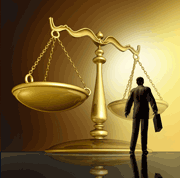
LAWYERS
Caution: This page contains ONLY GENERAL LEGAL INFORMATION.
It is NOT LEGAL ADVICE nor a replacement for talking to a lawyer
and getting legal advice about your case.
The law can be complicated and the details of a case can be even more complicated!
There are exceptions for every rule.
What you do not know can harm you. Do not rely on general legal information.
AT YOUR OWN RISK.
How Can A Lawyer Help?
Lawyers (also known as "Barristers and Solicitors"), of course, go to law school and learn the basis of the law. They study various areas of law and build a strong foundation in the law in general. As important is learning to "think like a lawyer" - understanding how the law resolves disputes. But this is just the beginning. Lawyers learn on the job, first when they article (apprentice) for a lawyer and, in the years that follow, when practicing law. Book learning is important, but so is experience in the courts, in interview rooms, and in meeting rooms.
A lawyer should understand:
-
the criteria used to decide issues
-
what evidence is needed to prove criteria are met
-
the rules that govern evidence and whether it will be considered by a judge
-
how to gather evidence
-
the processes used by courts
-
how judges look at cases
-
how to word the terms of orders and agreements
-
the possible consequences of the terms of orders and agreements
A lawyer should be able to:
-
advocate for the client - both in writing and verbally
-
analyze the case and give options and predictions of outcomes
-
give direct and useful advice to clients
It is important that lawyers do not get emotionally involved. They must clearly see the case and the paths to resolve it. They must step away from the anger or guilt. They should be less interested in "winning" or "losing", more on getting the best practical results for a client. They should see long term outcomes. This is very hard to do when it is your own life ... when you have a history with the other side ... when you are recovering from a separation. For this reason, even experienced family lawyers, in their personal family law disputes, hire other lawyers.
Do You Need A Lawyer?
What can you personally bring to this situation?
-
What ability do you have to pay for a lawyer?
-
What is your ability to represent yourself? To learn the knowledge required and acquire the skills? To deal with the issues in a calm, disciplined, and focus way? Can you put your (and your child's) long term interest above any feelings of anger, guilt, etc.? Can you be polite to the person you are in dispute with? Can you compromise for a workable resolution and end the dispute?
Understand that the judge can only make limited allowances for your lack of knowledge and skills. If you do not file the right court documents, do not share the necessary evidence, do not take reasonable positions, or do not present your case effectively, things can go very badly for you in court. You may know the facts and be passionate about your case, but this is not enough.
How important are the issues?
-
Is your relationship with your child and role as a parent at issue?
-
Is the long term well-being of your child at risk?
-
Is your financial well-being at risk? Is there a risk to your child's standard of living?
-
Is there enough money involved to make the cost (financial and conflict) worthwhile?
-
Is there a risk of jail?
Generally, a competent lawyer will be able to do a better job than you can. They can take part of the burden from you. What can you afford? What can you reasonably do? How much trouble do you want to go through? How important is this to you? What risks are you prepared to take?
